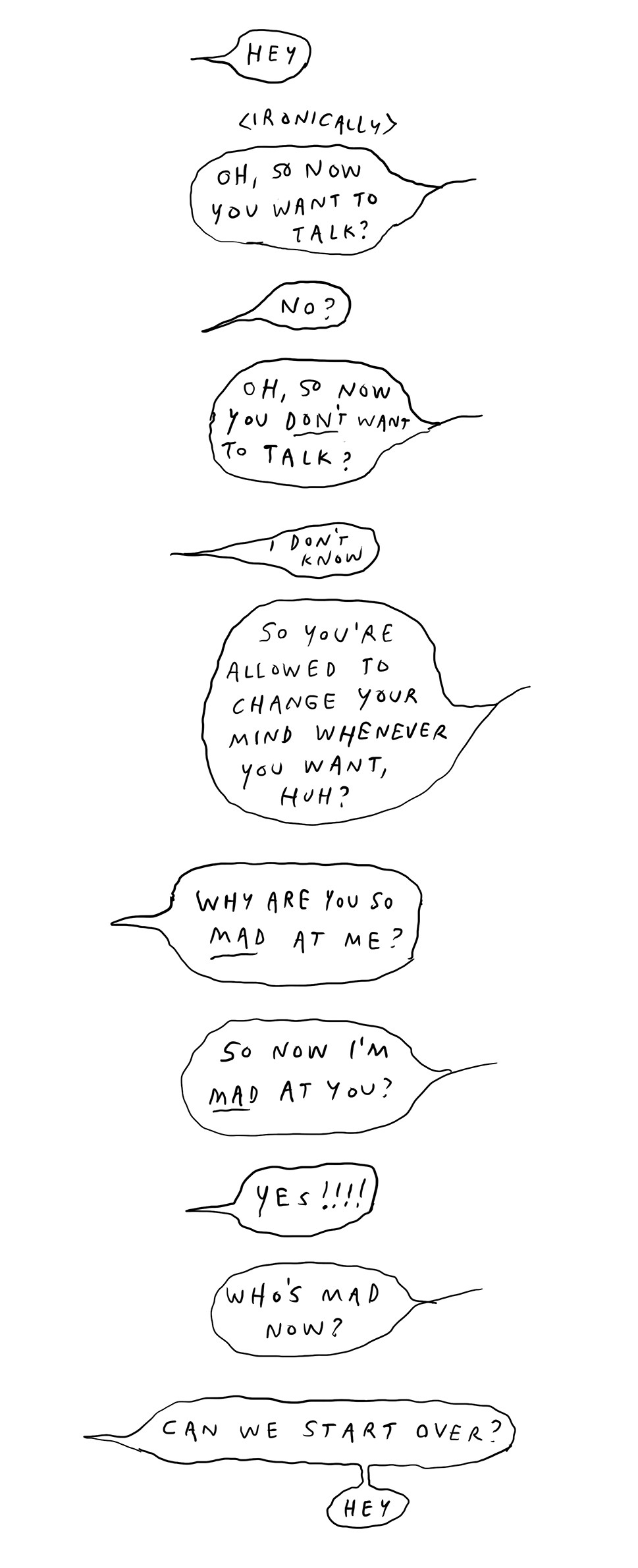What Can I Do About My Racist Parents?
And other answers to unsolicited questions.

“I think my parents are racist. What can I do?” — Not a Racist Ralph
Racism is a spectrum, like autism. Just because people voted for Donald Trump does not make them a racist, it just makes them think it’s fine for a U.S. President to be racist. Being a racist has only been a problem for presidents for the past fifty years. Before that, it was practically a job requirement.
I’m not even convinced that Donald Trump is a real racist, he just didn’t mind stoking racism and playing on the fears of rubes in suburbs. And just because one of your parents said something tone-deaf about racism during Thanksgiving dinner doesn’t mean they want to go to a KKK meeting.
Most people chafe at being called a racist. They will tell you they have a black friend. Do they have a Mexican friend they wouldn’t mind walling out? How about a Muslim friend they wouldn’t have a problem deporting? Probably not. But we should be willing to give most people the benefit of the doubt. There are a lot of racist people in America. A lot of that racism is just built on ignorance and fear of the unknown. Given a chance to have a black friend or a gay friend or to actually know a Mexican or Muslim person, the vast majority of people would be open-minded and welcoming. At least, that’s what I believe in my heart.
The first move with your racist parents is to decide where they are on the spectrum. Do they wear white sheets when you’re around? Would they disown you if you told them you were gay? Would they freak out if you dated a Hispanic person? A 10 on the spectrum is like Hitler. An 8 says things like “The White Race must rise again, etc.” An 7 is someone who emails everyone racist memes. A 5 is someone who won’t watch “Scandal” because it’s “a black show.” And so on.
If your parents are 10s on this scale, call the FBI immediately. You can still love your parents. But you should express that love through penitentiary plexiglass. 8s or 7s is a little harder to deal with. They’re pretty set in their ways. I’d say 1–6 along the spectrum would be offended and self-reflective if you called them a racist. You might be able to work on them.
No matter how racist your parents are, you should try to love them. That’s not always easy, but it’s as much for you as it is for them. You won’t want to suffer the guilt of wondering if you should have been there more for them while they were alive, etc. Do what you can, be there for them when it’s not so toxic for you. They have a lot to teach us, even if they’re jerks.
How do you create empathy where there is ignorance? Sometimes it feels like lectures or rants are counterproductive. If truly “the arc of the moral universe is long and bends towards justice” it can sometimes feel like that arc takes forever and is steeper than it should be. Incrementalism may not be en vogue during the Trump Years (we will instead incrementally reverse course) but if you continue to chip away at the iceberg it will eventually thaw.
This new fad of overt racism will fade with time. Promises have been made that cannot be kept. People have been played and lied to. And politicians will be held responsible for the garbage they’ve stirred to the surface. Plus, time is running out for the racists. White deaths are beating white births in many places, and 50% of births last year were to minorities.
I hope we get to live in an actual post-racial nation. One byproduct of all this insanity and madness is that we might finally have to deal with race in this country. I do believe, even after all this, that democracy works. And that the vast majority of people are good and want to live together in peace. Let’s hope we all get there, together.
Jim Behrle works at a bookstore and lives in Jersey City, NJ.
Playing Yourself-Improvement
Let’s try to get better at playing ourselves in 2017.

At the New Yorker today, Jia Tolentino declares 2016 “the year we played ourselves.” She describes the phenomenon like this:
The act of playing yourself can be loosely defined as working against your conscious intentions. It’s what you do when you think you’re serving your own interests but are actually betraying them — often through significant effort, often in a spectacularly public way.
In case you’re more of an example-based learner, here’s the case of one man who played himself twice over this year:
A striking 2016 example comes from a man in Vancouver, who, in dealing with the stress of his wife’s apparent infertility, developed a wandering eye. In order to indulge it, he asked his wife for an open marriage; she subsequently got pregnant by someone else. In June, he wrote a personal essay about this journey on the Huffington Post, and then, after facing ridicule, he requested that the editors delete it. (This story illustrates a crucial axiom of playing yourself in the age of the Internet: the act tends to beget more examples of the same.)
So essentially, playing yourself is making a big show out of demonstrating something, and then either bungling your point or contradicting yourself entirely during the demonstration. And we have played ourselves a lot this year: Anyone who bought a dad-style message hat for $45 to communicate their carefree, non-corporate lifestyle played themselves. Anyone who thought Kylie Jenner was a dunce who wasn’t gonna wring a couple hundred thousand bucks out of “the year of realizing stuff” played themselves. Donald Trump played himself when he won the presidency.
One of the toughest parts of playing yourself, though, is that the player’s understanding of their misstep isn’t necessarily part of the equation. Consider the chain of events: Up until the moment you play yourself, you think you’re pursuing a valuable goal backed by sound reasoning. When you don’t meet your goal, your first instinct may not be to ask, “Have I….. owned myself?” And unless someone takes you aside to help you understand what the deal is, you may very well miss the play altogether.
Tolentino uses the example of Abigail Fisher, the student who brought her 2008 rejection from the University of Texas to the Supreme Court claiming she was rejected because of her whiteness and therefore affirmative action is unconstitutional. She ended up losing the case (and the media had a fun time laughing at her sense of entitlement), but for all we know she may still be, to this day, playing herself. Publicly losing in court doesn’t mean Fisher now understands affirmative action’s constitutional tenets, it just means she’s been told, “This conversation is over. Unless something new comes up, please stop talking to us about college admissions.” Somewhere in America right now, at a chicas cocktail hour or an office holiday party, Abigail Fisher may very well still be playing herself post-mortem.
“Accepting that playing yourself happens, that’s the ideal way to go,” Tolentino posits in her piece, and I agree, but I’d also like to challenge us all to go a step further in 2017: Ask someone if you’re playing yourself when you suspect that you are. There’s a quote from Cicero I saw in a movie recently that goes, “It is the nature of every person to error, but only the fool perseveres in error.” In other words, it’s normal to fuck up. That doesn’t make you an idiot. What makes you an idiot is noticing you’re probably fucking up and choosing not to do anything about it.
So in this next calendar year, when the suspicion you’re in the middle of a self-own pops up, maybe turn to someone and say, “Hey, am I playing myself right now?” And maybe they’ll let you know. Maybe they’ll even talk to you about it and share some of their perspective, and you’ll be able to proceed with more than just your own thoughts and feelings to work from. Will it stop us from making mistakes? Of course not. It might even open the doors to make fresh new ones! But it also might help us understand our shit enough to not repeat our gaffes over and over again in new and exotic contexts.
Recognizing the phenomenon of playing ourselves in 2016 is definitely an important start, but it’s worthwhile to also try to get better at playing ourselves. Let’s get graceful in 2017. Constructive. That way, when we’re feeling embarrassed or like we’ve failed, we can say, “I’m embarrassed!” or “I suspect I just failed!” and learn from it, like people who are more interested in making progress than protecting our egos.
The Lost Generation
The Adventures of Liana Finck
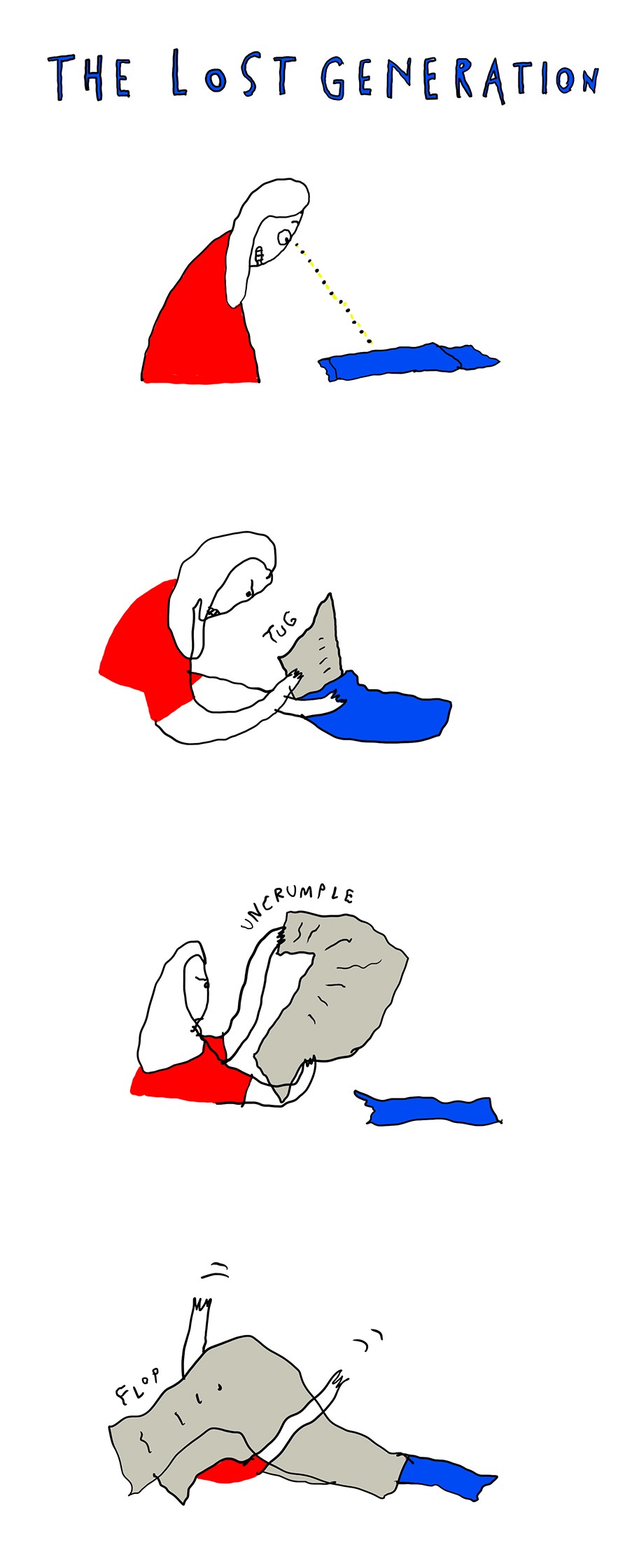
Liana Finck is on Instagram and sometimes in The New Yorker. She lives in Albuquerque, in case you’re trying to find her.
Duckett, "Everything Works Backwards"
You know who knows anything? Nobody.

I am currently reading Tony Judt’s Postwar: A History of Europe Since 1945, and I am at the part where the Soviet Union has collapsed and the nations of Eastern Europe are finally free from Communist oppression. These are events that I actually lived through, and while what I best remember about that time is being irritated by how often MTV played Jesus Jones’ “Right Here, Right Now,” I also recall the shock at how seemingly swiftly it happened and the giddy optimism about everything being okay from then on. Naturally, it turned out a little differently from what we all anticipated, and it’s a good reminder that our expectations are often at odds with everything we know that occurred previously. “The arc of the moral universe is long, but it bends toward justice,” is a beautiful sentiment, but it presumes that there is such a thing as justice, or even a moral universe that has an inclination to bend in its direction, when really people do bad things to other people for as long as they can and until they are forced to stop and even then there is a part of them that lays in wait, for hundreds of years if necessary, until they can do it again. When viewed in this light only the good things that happened in history should really be seen as a surprise, which I guess is what Jesus Jones was on about in that fucking inescapable video back in 1991.
So. What can you say about a weekend where the only good news was that Austria decided not to vote for a far-right nationalist as president? Austria! Are we really entering a century where Germany and Austria are going to be the beacons of hope and freedom that rise above the totalitarian tide washing over the rest of the world? Who knows? Not me, and certainly not anyone who tells you that they do. Nobody knows anything, but everyone sure seems pretty loud about their own opinions. And certain, so fucking certain. You know that Jonathan Swift quote, “When a true genius appears in the world, you may know him by this sign, that the dunces are all in confederacy against him”? If he were alive today he would have to revise it to, “When anything anywhere appears in the world, you may know it by this sign, that the dunces are all in on social media telling you what it means and how you should react to it, usually in a series of tweets that show up out of sequence when some other dunce, whose idiot opinion it has confirmed, points to it with a succinct and seemingly authoritative ‘Thread.’” Everyone’s a fucking dunce and all they want to do is show you how smart they are. God, I really need to get off Twitter. I’m the biggest dunce of all.
Anyway, here’s music. This will be especially helpful if you’ve got Jesus Jones stuck in your head, sorry. Enjoy.
New York City, December 1, 2016

★★★ Golden clouds on blue, and the shining fog-less river, together announced a new kind of day. That announcement had not yet reached down into the shadowed pavement of the schoolyard, thickly covered in puddles. The sun would not be steady enough for drying things, but the wind carried off most of the water by midday as it buffeted the apartment windows. The bare sidewalk still held the spiky tannic shapes of pin oak leaves where they’d fallen in the soaking rain. The thermometer said early afternoon was about as warm as morning had been, but the wind-cooled cotton sleeves of the jacket against the bare arms underneath said otherwise. A crisp, newly shed oak leaf scuttled in on a gust through the exit of the market.
The High Life
Manufacturing a spectacle in Xianju
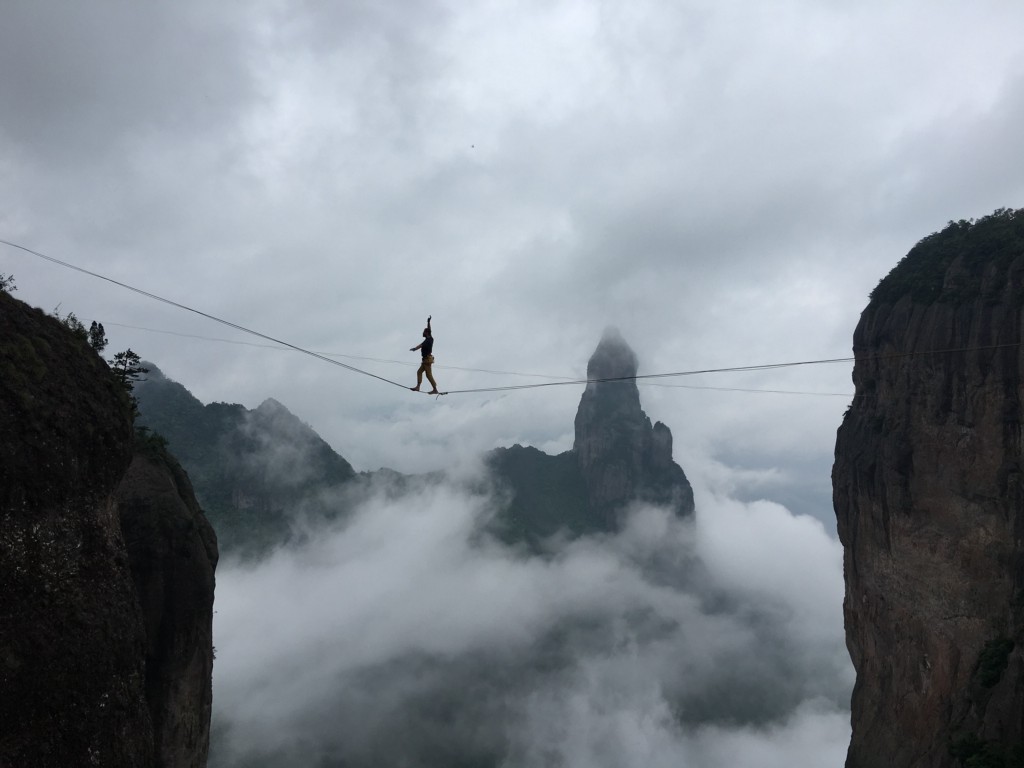
The highliners sprang into handstands and whooped as they raced around the airport on luggage carts. They were in China! For a week, they were going to walk and fall and dangle from polyester lines stretched across towers of volcanic rock in Zhejiang, an eastern coastal province. They would to sleep in a fancy hotel, eat rich meals, and receive blue envelopes of fresh, pink hundred Yuan bills. They would make predictable jokes about eating dog meat and make fun of the locals, who in turn, would photograph them as if they were wild animals, recklessly and with glee.
They were there for the 3rd Annual Shenxianju International Highlining Meeting, in May of 2016. The whole thing was a lavish PR effort funded by the Chinese tourism board of the Xianju region, and organized by outdoor sports agency, Huway.com. “Don’t let them pay for anything,” I overheard someone from Huway instruct. The contestants were honored guests, and China wanted to make a great impression. They were world record holders and sponsored highliners from the U.S. and Canada and Europe and Brazil, and they all hated the question everyone always asked: “So is highlining like tightrope walking?” (Answer: Yes, only you walk on a piece of loose webbing rather than taut wire.) There was just one female contestant — Sonya Iverson, an American — and the rest were men: lean, tall, and handsome.
They were jet-lagged but giddy as they arrived at the hotel in Xianju city; for many, it was their first trip to China. The women of the Huway team giggled as they greeted the dreamy foreigners, who laughed at the ridiculous nicknames they’d been assigned in a brochure: “Sky Elf,” “Naughty Slackliner,” “the “Limit King.” Little attention was paid to the second half of the brochure, which described the breathtaking nature of the Shenxianju Scenic Region where the highlining would take place. It showed photos of lush farm lands and ancient Chinese villages; Huway didn’t bother with English translations.

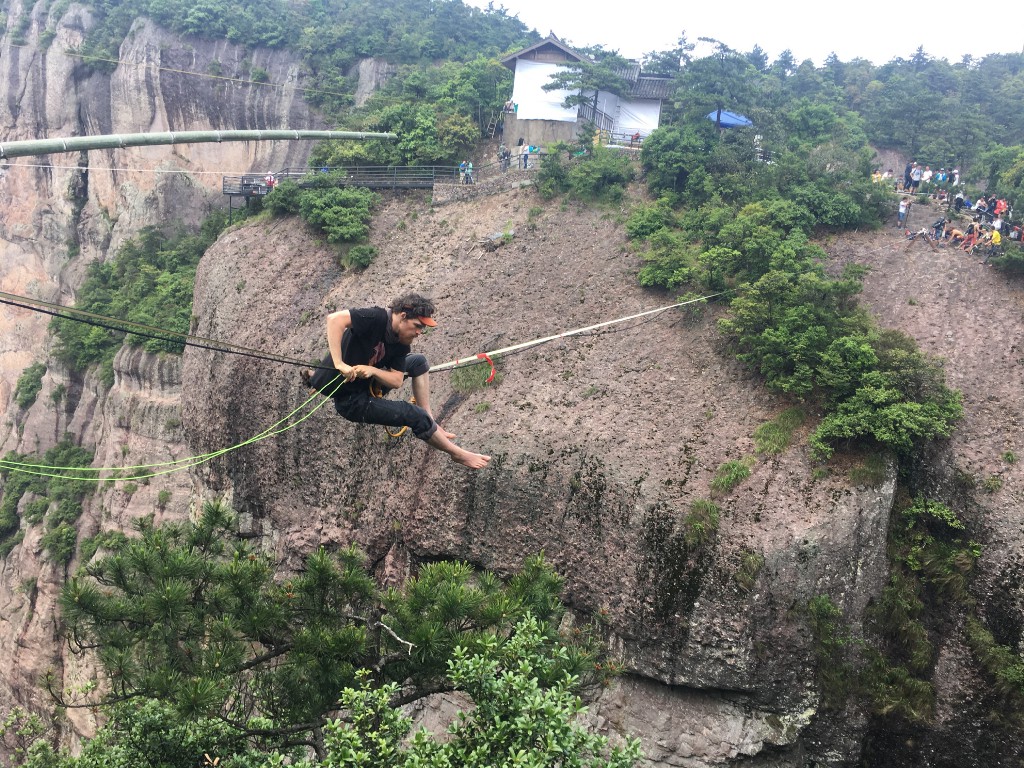
It takes an hour to get from Xianju to the sprawling, natural volcanic towers, waterfalls and streams of Shenxianju. Shenxianju was designated as a Scenic Area in 1998, but it wasn’t until 2013 (the first year the park hosted a highlining festival) that the Chinese government invested 150 million yuan (about 22 million dollars) to give it a major makeover. Despite the heavy promotion, the park remains mostly unknown to foreigners today, with exactly two English reviews on Tripadvisor and no mention in any of the usual travel guides. Affluent locals from neighboring provinces who can afford the 125 RMB entrance fee come to the park for weekend trips, and locals from Xianju county are allowed in for free.
Shenxianju was still under construction, which in China means shaping a natural landscape into easy access and profit: cable cars and guardrails with the park’s name marked across in huge red letters, a souvenir photo booth where you can buy memories with cash. For the festival, Huway had added in decorative touches: intricately carved Chinese lanterns and flags advertising the festival that hung alongside the stone stairs up the mountain. The steps ran alongside a bubbling stream until you arrived at the cable cars, which took you on a drowsy ride to the top, above the clouds and the subtropical greens.
Up high, there were two parallel 50-meter highlines set up for the speed competition. They were anchored to the distinguish volcanic rock of the region — “Shit rock,” the highliners called it, because it broke easily, which made it harder to drill anchors and rig lines. But it was beautiful: shades of rust and white and mahogany and gray, with crevices that looked like the a giant had molded the surfaces. When the fog misted over the rocks, the park did look magical, like the English translation of its name: the residence of fairies.
I didn’t have an official badge announcing me as press, but I made it past security. I’d already had tense conversations with the CEO of Huway, who regarded me with deep suspicion when I couldn’t answer her questions about what I was going to write. (Reporters Without Borders ranks China’s freedom of press as 176 out of 180, ranking only two above North Korea.) A tomboy from Huway, a baseball cap tucked on her head, was live-streaming the preparations on her phone. She called out to the finalists and beckoned them to wave. One of the younger contestants, a pale, blonde and blue-eyed European obliged, then started speaking in that singsong, gibberish mock-Chinese, which shocked me. It would have been wildly offensive in the west, but here, the girl from Huway simply giggled.
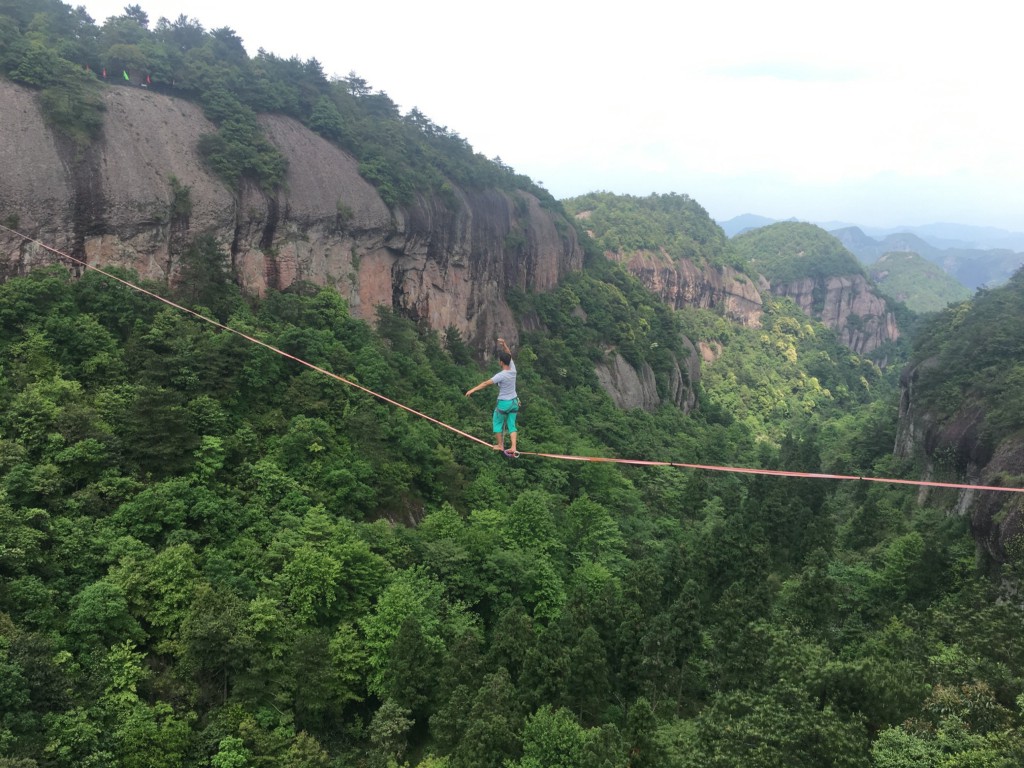
A pretty Chinese reporter from one of the major TV stations was there to narrate the competition, wearing the same gauzy chiffon blouse as the day before. The competition would be broadcast live to some 300 million viewers across 13 provinces in China. In typical fashion, the reporter made everything highly dramatic, like when two contestants tossed a coin to decide which line to walk (one of the lines was tensioned looser than the other).
The final race of the day actually was tense: Danny Mensik and Nathan Paulin, the stars who’d recently set a world record together, raced steadily, pace on par, until Danny suddenly fell and caught the line near the finish. Nathan stepped to a win. Sonya Iverson waited for the winners at a recently constructed award stage, handing them congratulatory trophies and bouquets. The winners raised posters with the amount of their winnings overhead and grinned, answering questions for the cameras.
After the competition, the mood lifted. A Huway employee wanted to try the highline, and then the CEO decided to do the same. It was impossible for an inexperienced highliner to simply step on, of course. He got clipped in on the line with a hangover, a pulley device that allowed him to glide along as if he were on a zipline. To sit up, he had to unclip himself, hang from the rope, and then climb back up to the line. He struggled to pull himself up. He spun slowly midair, dangling his pale legs.
“You can’t come back without giving us a raise!” The Huway team called out. They had all gathered around to watch. “Three days work, four days vacation!” They chanted.
“I’d rather die!” He called back, laughing.


That night, everyone moved to a hotel close to the park for a big party. Two long, banquet tables split a large white tent in halves. The foreigners were on one side, in their least dirty pants and sandals, and the Chinese were on the other, in fancy shirts and complicated dresses. An entire table displayed colorful desserts and drinks, so intricately decorated they looked fake. Another table served a buffet style approximation of a Western dinner: salad, cold fried eggs, spaghetti, half-cooked steak, and heart-shaped tater tots.
The Chinese officials gave florid speeches. At the end of the table, the Chinese tapped on their phone screens while the foreigners exchanged whispered small talk. When Rio Zhang — the Chinese highliner who helped organize the event — took the stage, the highliners burst into wild, earnest applause. He had an announcement to make: he’d recently gotten married. To celebrate, he handed out red satin coin purses for everyone at the party, a spin on the tradition of giving wedding guests small favors. The purses held chocolates and Chinese figs to represent the meeting of the West and East.
Someone put on KTV (Asian-style karaoke) and roused the Huway team to sing “Xiao Ping Guo,” an infuriatingly catchy Chinese pop song. A Chinese man in a red patterned shirt danced more exaggerated moves than anyone. At last, the barrier was broken. Foreigners and Chinese laughed together, linked arms for high kicks, then a game of limbo, and then a conga line around the room. Dancers tossed flower petals into the air in drunken jubilation.
Later, a Chinese woman recruited me to announce to the foreigners that the party was over: tourists visiting from Shanghai had been complaining for the past hour. The highliners complained back: why couldn’t the tourists understand that it was just one night? “They need to open their minds!” Someone said, and someone else cut in: “I think we’re opening their minds already.” A bunch of drunk, shirtless Westerners danced wildly into the night.
I spoke to Harry Hoglinger, an Austrian highliner, about the festival’s extravagant resources. Huway covered all of the participants’ travel costs (airfare, visa, food, hotel) as well as advertising and staff (posters, flags, t-shirts, gifts, the billboards). Hoglinger had been recruited by Rio Zhang and Huway to helped out at the festival the past two years. He could see the glamorous image it was trying to project, and its problems too: the disorganization despite the grand plans, the conservatism in the face of advancement.
“I think it’s more embarrassing to see the shiny surface and the shit underneath than to admit that process takes time,” Hoglinger said. He thought China was losing its heritage, and picking up the worst habits from the West: over-construction, reckless materialism, waste. But to me, some of the highliners also seemed ungrateful. They were well paid for the trip, honored in a culture not their own, but made little effort to see China or talk to locals outside of their prearranged schedules.


The lavish resources tapered off in the days following the televised portion of the competition. Lunch, which used to be a table full of dishes, reverted back to rice or noodles in plastic bowls. There were no more TV stations or scary security guys, just surprised Chinese tourists, exclaiming: “laowai!” (foreigners!), and: “woa bu gan kan le!” (I’m too scared to watch), as they raised their smartphones and cameras.
The weather was fickle, often rainy and gray. On a rest day, half of the highliners stayed in the hotel, turning an upstairs lounge into a yoga studio. Smaller groups went up to the mountain. One day, a bout of food poisoning hit the highliners. They curled up on benches and hid in their rooms, avoiding a sparsely attended dinner.
On my last night, I went for a walk in Xianju, ducking cars and electric motorbikes. Like every other city in China, it has a wide commercial street running down its center, full of bright lights and clothing shops. Tanned, leathery old folks gathered on wooden stools outside a video store, watching a movie playing on a TV facing the street. In the shoe store next door, a customer handed over bills like play money while an employee threw deflated balloons out on the sidewalk.
The buildings were old, with chipping tile roofs and cement doors. Some consisted of a single room — a cot, a rusty kettle, a few pieces of antique furniture. One room doubled as a cigarette shop, with a dusty, scratched display hanging up, while the owner lounged on a divan in front of the TV, visible to any passerby. Stray dogs scampered and barked. Even further back, there were no lights at all. For dinner, I ate anything (hotdogs, octopuses, tofu, lettuce, mushrooms, anything) on sticks that cost two yuan each, grilled quickly over an open fire and brushed with sauce.
I stopped in the plaza across the street, where the locals were dancing to a soundtrack of old Chinese pop. It was a variation of square dancing, a ritual I saw often in parks and plazas around China, which often looked silly: a crowd of middle-aged Chinese uncles and aunties, doing synchronized sequences to bad pop music. Tonight, though, they were dancing the waltz. The dancers moved in rhythm, their loafers and heels silhouetted against the light. It was old-fashioned, simple, dated: not the glamorous image of economic boom that China wanted to sell. It’d never appear on the tourism brochures or be broadcasted across TV stations in China. But sitting there, watching, I got a little sad that the highliners — and the rest of the world — rarely got to see it.
Laura Yan is a writer, artist, and bird president of Twitter. Her stories have appeared in GQ, Pacific Standard, Longreads, GOOD, Jezebel and elsewhere.
The Difficulties of Door-Opening, With Casey Affleck
It’s really hard.
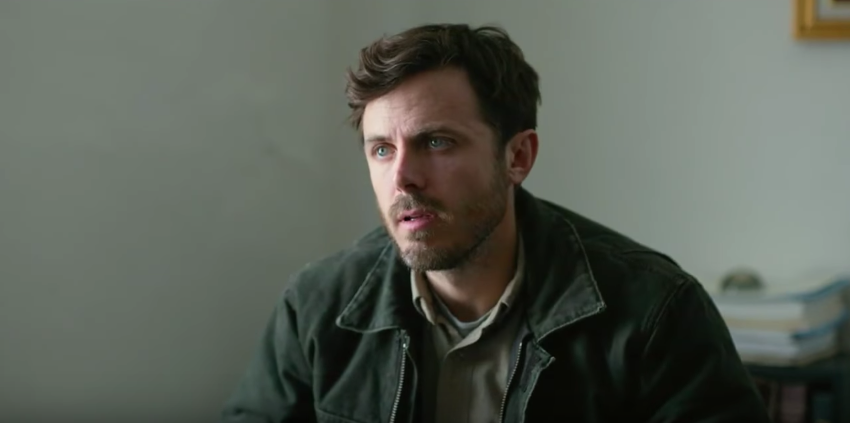
I don’t know if you’re going to be able to believe this, but Casey Affleck weighed in on social issues, and he did it in a narrowly focused way!
I know this because The Hollywood Reporter tweeted the following graphic today:
Casey Affleck on how Hollywood can change its race problem https://t.co/aZew9jOo7N
— @THR
I did the self-harm behavior of clicking on the article so you don’t have to, and it’s from an actors’ roundtable Affleck recently did with Jeff Bridges, Mahershala Ali, Andrew Garfield, Joseph Gordon-Levitt and Dev Patel. He made the comment in response to a question from the reporter: Are roles more limited for non-white actors?
Ali actually turns to Dev Patel (the only other P.O.C. on the panel) and says, “Take it, brother.” (Something we could all practice doing more often.) Patel speaks about typecasting within the industry, and Ali replies with his thoughts on acting in films like Moonlight versus playing roles that often weren’t written for a black actor. Great! A dialogue! Then, as if unable to sit for two seconds without weighing in, Casey Affleck jumps into the mix with the quote in that tweet. Weirdly, the interviewer immediately decides to change the subject to something the whole panel can give a G-rated answer to: Can any of you imagine giving up acting? Hm Casey!!!! I wonder what happened there!!!
As a Language Arts exercise, I would love to map Casey Affleck’s words, because that statement on its own is actually a very rich and nuanced text.
“As a group of artists, as a community, we have an obligation to try to open doors. But it’s really hard to go just from top down.”
Let’s start easy. “As a group of artists, as a community.” We can assume this means “as an industry” a.k.a. “as directors, actors, producers, etc.” a.k.a. “as a group of people with jobs traditionally and institutionally operated by and for the profit of white men.” So “as a white man.” Got it.
“We have an obligation” is actually the most straightforward part of this statement. “We” (white men) “have” (are in possession of) “an obligation” (an act or course of action to which a person is morally or legally bound; a duty or commitment). White men have a moral and legal duty.
“To try to open doors.” Okay so we’re waffling a little bit after that firm “obligation” word choice. “To try.” You have an obligation to attempt to open doors for people who do not have the power to open those doors on their own? And that’s where the obligation stops? After you feel you’ve tried to open the door? Like when you’re in the elevator and “try to” hold the door open for the person a few steps away who’d like to get on? Like when you’re walking out of the movie theater and “try to” hold onto the door long enough that it doesn’t close on the slow person behind you? How often are we really trying and failing to open doors for each other as a culture? If you are there, holding a door, and really intend for someone else to pass through it, isn’t there not much more effort required? Aren’t you, perhaps, in the one position in the world that might ensure someone else’s safe passage through the door? Hm.
“But it’s really hard.” — traditional Caucasian proverb
“To go just.” Mmm here’s a fun one. “Just.” Only. Merely. Simply. This is deflecting language. This is language you use when you’re acknowledging someone’s position as a means to pivot back toward your own point of view, where you’re comfortable. “Yes I see that you are saying something, and you have a right to say it, it’s just that I too am also saying something.” It’s a way of seeming constructive while still being fixated on your own asshole.
“From top down.” From a position of privilege. From power. “It’s really hard to go just from top down.” Is it? Difficult? Casey? Harder, say, than not being able to get work in your chosen field because of the color of your skin or your gender or any of the other myriad traits you have no control over? Is it hard for you to hold the door open when you have financial security and a voice that people listen to? Okay. Then maybe imagine approaching the same project without those resources. Would it, perhaps, also be hard? Could it, even, maybe, seem more difficult than the difficulties you’re enduring in certain ways? Great. This is not a pain competition. This is not a difficulty dick-measuring contest. Things suck for everyone. Open the goddamn door when you can and hold it that way, and maybe someday someone will do it for you when you need it. That day is not today, though. You already have the job. You have the reporter and the graphics team and the social media professional scheduling out the tweet of your face to remind people that you are alive and hirable.
And this is what you said with that platform. Here are the words you picked.
Making The First Move
At the 2016 World Chess Championships

The bouncer guarding the door to the World Chess Federation’s Championship in New York City on Wednesday was polite, but firm. Twinkling braces sliced across his large, white teeth. “We’re not supposed to let anyone in until one. They’re almost finished setting up.” The large, conservatively dressed crowd on the Fulton Market curb groaned good-naturedly. People wearing fedoras pulled out crossword puzzles, Russian news crews brandished cameras, and the few women amongst the multitude of men made friendly, significant eye contact.
A cluster of people were talking animatedly with their hands. “The Fischer-Spassky game captured everyone’s interest,” explained Tom Elmquist, a cardiologist from the Upper West Side. He was referring to the famed 1972 clash between American grandmaster Bobby Fischer and defending Soviet champion Boris Spassky. The final took place in Iceland. “There were two commentators from The New York Times every day. You couldn’t watch the game, you could only read about it, because Fischer was in vehement opposition to a live broadcast.”
This year’s finalists raised no such objections to the intrusion of technology. Magnus Carlsen of Norway and Sergey Karjakin of Russia, both twenty-six, have Instagram accounts. Karjakin devotes much of his content to pictures of his wife, while Carlsen’s posts usually feature high-resolution images of his own, casually handsome face (Carlsen also received a glowing profile in The New Yorker in 2011). The entire tournament has been tracked by Twitter hashtags, livestream simulcasting, and television commentary.
Around 1 p.m., the hordes of chess fans were finally allowed inside. Miserable rain battered insistently against the broad market windows, but that didn’t stop many from venturing out onto a sheltered balcony to share cigarettes and abridged backstories. One of them was Christian De Luca, a stockbroker and master player from Buenos Aires—his English was limited to friendly chatter about Argentine steak and American hotels. There were several men like De Luca at the tournament: upper middle-class, eager to express enthusiasm for such an intellectually robust pastime.
When it was time to play, a few event coordinators descended upon a narrow black table bearing a simple wood board and several bottles of water. A broadcast technician adjusted his lens. A man wearing a well-cut suit entered the small room through a hidden door, crossed to Karjakin and the reigning champion Carlsen, and shook both their hands. Nobody in the audience, which was hidden behind a pane of thick one-way glass, seemed to recognize the billionaire venture capitalist and founder of PayPal who engineered the shutdown of Gawker and donated both funds and flattering endorsements to President-elect Donald Trump. Peter Thiel is a former chess prodigy, ranked 962nd nationally and 21,930th worldwide.
Thiel consulted quietly with Karjakin, the Russian challenger, his icy blue eyes peering out from beneath a heavy brow. As the players settled into their chairs, Karjakin indicated that Thiel should take one of his pawns. Thiel obliged, moving the piece two spaces forward, thereby making the ceremonial first move in the tiebreaker tournament. According to Business Insider, Thiel was later spotted in the VIP section, challenging a young girl to a game.
It took Magnus Carlsen approximately four hours to defend his title. After two suspenseful games ended in stalemate, the Norwegian strategist who earned his Grandmaster rank at the age of thirteen began to rattle Karjakin, whose brilliant defensive moves became steadily less effective. Carlsen took the third match like a conqueror. He finished the fourth in fifty moves, slid his queen to h6, shook Karjakin’s hand, and left to attend his victory party. It was his twenty-seventh birthday.
50.Qh6+ is the way to wrap up the best possible birthday gift. https://t.co/FBXx8Jg2nd #CarlsenKarjakin https://t.co/G0mwGeotDW
Helen Holmes is a writer living in Manhattan.
Dark Sky, "Voim"
Is every week going to be like this from now on?
Hey, it’s Friday! What’s happening on the Internet?
Looks like we had to turn comments off on story about Mall of America’s first black Santa. Merry Christmas everyone! https://t.co/BQVm24DH6y
Okay, I’m ready to look away for a couple of days, how about you?
Here’s some music that if nothing else will let you forget just how terrible things are for seven minutes. Enjoy it while you can because it’s not going to get better!
What a world. Thank God we’re almost done living in it.


